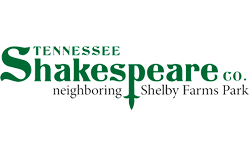TSC Named 1 of 40 U.S. Theatres to Receive Shakespeare in American Communities Schools Grant and 1 of 7 U.S. Theatres to Receive its Juvenile Justice Grant from the National Endowment for the Arts/Arts Midwest

Arts Midwest (Minneapolis, MN) announced Tennessee Shakespeare Company (TSC) is one of 40 national recipients of $1 million in Shakespeare in American Communities: Schools grants to nonprofit, professional theatre companies from 25 states and the District of Columbia. Arts Midwest also announced TSC is one of the first seven grantees in an initiative to expand the National Endowment for the Arts’ long-standing Shakespeare in American Communities program into the juvenile justice system. Shakespeare in American Communities: Juvenile Justice will provide $170,000 in federal funds specifically earmarked for programming for young people in the U.S. criminal justice system over the next year.
The awards mark the seventeenth consecutive year of Shakespeare in American Communities, a national program managed by Arts Midwest in partnership with the National Endowment for the Arts. Since the program’s inception in 2003, Shakespeare in American Communities has introduced more than three million middle and high school students to the power of live theatre and the masterpieces of William Shakespeare through performances and educational activities.
TSC receives the Schools matching grant award of $25,000 for its innovative 2019 Romeo and Juliet Project for the sixth time in its organizational history.
The Project will perform Romeo and Juliet nearly 30 times in more than 20 Memphis area high schools and teach over 700 in-school sessions for a total of 24,000 student interactions with a curriculum-based, classical play that teaches compassion, non-violence, and a personal connection to Shakespeare’s plays.
TSC will partner with Shelby County Schools, the Germantown Municipal School District, the Collierville Municipal School District, charter schools, and private schools to engage ninth-grade students interactively with classical text that is part of the core Language Arts curriculum in the state.
“Since 2003, the National Endowment for the Arts has brought professional performances of Shakespeare’s plays to millions of middle and high school students in cities and towns across the United States.” said Mary Anne Carter, acting chairman of the Arts Endowment.
One hundred and twelve theater companies across the United States have taken part in Shakespeare in American Communities since 2003. These companies have presented 33 Shakespeare plays through 12,900 performances and 45,800 educational activities at more than 10,400 schools in 4,400 communities in all 50 states, the District of Columbia, and the U.S. Virgin Islands.
“Shakespeare’s plays come to life on traditional stages and in school gymnasiums across the country because of Arts Midwest’s longtime partnership with the National Endowment for the Arts,” said Christy Dickinson, Arts Midwest’s senior program director. “These theater companies and programs are woven into the fabric of these schools and enhance the study of a Shakespeare play in the classroom through educational activities that get Shakespeare’s words into their bodies and make them come to life. For a moment, these students turn off their cell phones and are enthralled in a story that connects them to Shakespeare’s characters in a way they never imagined. These companies continue to emphasize diversity within their casts and these student audiences see themselves reflected on stage.”
In addition to TSC, the national group of awarded regional theatres includes, among others, Alley Theatre (TX), American Shakespeare Center (VA), Chicago Shakespeare Theatre, the Guthrie Theater (MN), Oregon Shakespeare Festival, and Utah Shakespeare Festival.
TSC receives the Juvenile Justice grant award of $20,000 to expand its inspired work and number of trained Teaching Artists into Shelby County’s three youth lock-up facilities in 2019-20. This grant, presented for the first time, does not require matching funds.
This national program, devised by the NEA and Arts Midwest, seeks to expand upon the success of previous inter-agency partnerships with the Department of Defense (2003) to present plays on military bases, and with the Department of Justice (2009-2011) to reach young people in the juvenile justice system through artistic programming. Although Shakesp
Arts Midwest conducted a panel review of arts organizations with proven track records of teaching the works of William Shakespeare within the juvenile justice system.
Arts Midwest’s previous work with partners in criminal justice facilities and the NEA’s research into the impact of arts programming for youth and adults in the criminal justice system have both demonstrated great potential for the program to help with some of the underlying causes of vexing problems such as re-entry from prison to community and reducing recidivism.
“Quantifiable research demonstrates that prison arts programs – such as the agency’s Shakespeare for American Communities: Juvenile Justice program – build self-confidence, self-discipline, and creative thinking in participants. We know that the longer someone is involved with a prison arts program, the more likely they are to show positive behavioral changes,” said Mary Anne Carter.
In addition to TSC, the national group of first-time recipients includes Actors’ Shakespeare Project (MA), Delaware Shakespeare, Kentucky Shakespeare, Marin Shakespeare Company (CA), Shakespeare & Company (MA), and Shakespeare Behind Bars (MI).
“Plato urged that education be defined as the enrichment of the soul,” says Dan McCleary, TSC Founder and Producing Artistic Director, “and we are deeply grateful that our National Endowment for the Arts and Arts Midwest remain sensitive to this definition during a period of formal education standards and academic measurements based largely on test scores. TSC accepts as its daily charge to move the arts closer to the center of every child’s formal education, no matter where they are, what institution they are in, what their academic achievement is, or their discipline or learning levels.
“We are honored to be among just 40 regional theatres again this year to receive these matching funds, which are crucial to our expansion into every Freshman Language Arts class. And what an enormous honor to be named among the first seven theatre recipients awarded by the NEA and Arts Midwest for our concerted efforts in juvenile justice in Shelby County. Our intrepid Teaching Artists are overjoyed.
“Regarding the matching funds requirement for the Schools grant, I am pleased to announce that within 48 hours of TSC announcing the need, more than 30 generous individuals and corporations made matching contributions, led by our friends at FedEx and International Paper. We met the goal last Friday. We are most grateful to our caring, supportive community.”
The news of both announcements by Arts Midwest in Minneapolis can be viewed here:
About Arts Midwest
Arts Midwest promotes creativity, nurtures cultural leadership, and engages people in meaningful arts experiences, bringing vitality to Midwest communities and enriching people’s lives. Based in Minneapolis, Arts Midwest connects the arts to audiences throughout the nine-state region of Illinois, Indiana, Iowa, Michigan, Minnesota, North Dakota, Ohio, South Dakota, and Wisconsin. One of six nonprofit regional arts organizations in the United States, Arts Midwest’s history spans more than 30 years. For more information, visit artsmidwest.org.
About the National Endowment for the Arts
Established by Congress in 1965, the NEA is the independent federal agency whose funding and support gives Americans the opportunity to participate in the arts, exercise their imaginations, and develop their creative capacities. Through partnerships with state arts agencies, local leaders, other federal agencies, and the philanthropic sector, the NEA supports arts learning, affirms and celebrates America’s rich and diverse cultural heritage, and extends its work to promote equal access to the arts in every community across America. For more information, visit arts.gov.
About Tennessee Shakespeare Company
Created in 2008 by Dan McCleary, TSC is the Mid-South’s professional, 501(c)(3) theatre and education organization which performs the plays of William Shakespeare as well as other classical and Southern writers, and provides innovative year-round educational and training programming.
In August 2017, TSC purchased outright the former home of Ballet Memphis, which TSC is remodeling into the state’s first and only permanent home for professional, year-round Shakespeare performance, education, and training.
Now concluding its eleventh season, TSC has produced 48 site-specific plays and events for over 55,000 patrons since inception. Its innovative Education program has reached 130 schools across nine states, totaling over 250,000 student interactions.
TSC’s education program has achieved a high regional and national profile. The program has been endorsed by Shelby County Schools, Germantown Municipal Schools, Collierville Municipal schools, and the National Endowment for the Arts.
TSC’s generous season sponsors include FedEx; the family of Ernest and Pat Kelly; Nancy R. Copp; C. Cato Ealy; International Paper; Independent Bank; Tennessee Arts Commission; First Tennessee Foundation; Barbara B. Apperson Angel Fund; Evans/Petree, P.C.; Arts Midwest; and The National Endowment for the Arts. TSC’s season is funded under a Grant Contract with the State of Tennessee. For more information: www.

